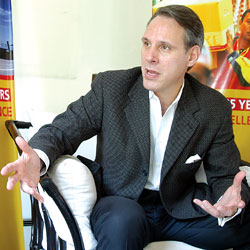|
|
Scott Price: Twenty-five years ago, we averaged five shipments a week, or 250 a year. Today we have 115,000 shipments a year and nearly 70 employees. That reflects significant development in Nepal's economic maturity. We certainly had challenges in the last couple of years, but we haven't seen a significant downturn despite Nepal's political situation.
How does Nepal fit in with your overall Asia strategy?
I look after 41 countries in the Asia Pacific. You have the mature economies of Japan, Korea, and Australia. Then you have India and China with significant foreign direct investment attractions. Now companies want to hedge their bets and there's increasing support for smaller countries coming together, as trading blocks in the common market. Nepal has a place within that, but there is a direct correlation between an unstable government and a reduction in foreign direct investment. We also move amid regulatory obstacles. The high level of foreign direct investment relative to high-end manufacturing and assembly is very closely correlated to the international express business. What we push for is customs and airport flexibility that facilitates the industry.
Where is Nepal among Asian countries, in the bottom half or the top half?
The bottom half; but countries like Thailand fall into the same category. More and more governments are recognising the impact the customs regime has upon trade, so you're seeing more countries exchanging information and aligning towards equalising the level at which you don't charge customs duty, because it helps their economy. Nepal could also make progress in the customs area for the benefit of the economy overall.
Is security a major hassle now?
Absolutely. And it's getting worse, in the sense that they're more stringent. We have always been very careful about security because we use commercial airlifts, we load on passenger airlines. After 9/11, the US put in much more aggressive requirements in terms of security, and many countries in Asia are following American rules. The US is such a huge import market, you might as well follow your largest customer.
Your company has done some particularly good corporate social responsibility work with consumers in Nepal.
DHL is about 25-30 years old in the Asia Pacific and about 5-10 years ago, we began in corporate social responsibility. I think that's the maturity of a company, when you reach a size where you feel the need to give back to your community. In this part of the world, the focus is on education. I was very impressed with the school I was taken to. Sometimes, even when you want to do good, you can't find a local partner who can help you to do that well. However, we are very focused on corporate social responsibility and volunteering our time. Our people enjoy it very much.



